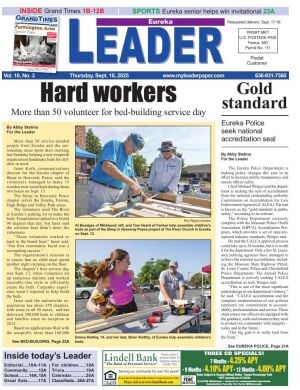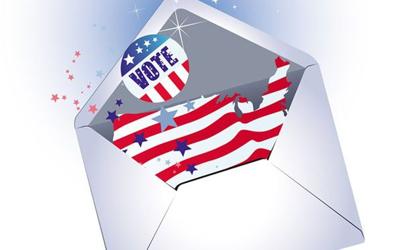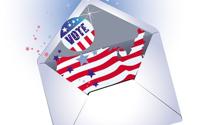Jefferson County residents may now apply for a mail-in ballot for the Aug. 4 primary election.
It is the first time residents may vote by mail, other than by absentee ballot.
The new mail-in option, which has been made available because of the COVID-19 pandemic, also will be offered for the Nov. 3 general election.
Applications for mail-in ballots for the November election won’t be available until after the August election.
The mail-in ballot application is similar to the process for the normal absentee ballot, but there are distinctions between the two, County Clerk Ken Waller said.
“Normally, if you’re requesting an absentee ballot, you have to provide a reason – you will be out of the county on Election Day, you are in the military, you are ill and cannot come to the polls or you’re taking care of someone who’s ill.
“This year, they’ve added a new category (for absentee ballots) – if you’re at risk of contracting COVID-19,” he said.
Those considered at risk, according to the law passed by the General Assembly and signed by Gov. Mike Parson on June 4, include people who are 65 years old or older, are in a longterm care facility, have chronic lung disease, severe heart conditions, moderate or severe asthma, diabetes, liver disease, chronic kidney disease or are on dialysis or have a compromised immune system.
“That (new reason to vote by absentee) will be available for the August primary election and November general election,” Waller said.
However, no reason is needed to apply for the mail-in ballots. So, those who are simply worried about going to the polls but don’t fall into any of the categories for an absentee ballot may request a mail-in ballot instead – again, available only for the August and November elections this year.
“You don’t need to give us a reason why you want a mail-in ballot,” said Jeannie Goff, chief of staff. “It can be COVID-related or not.”
The deadline to apply for the mail-in ballot is July 22, the same deadline to apply to vote absentee.
“There are important differences that people need to know,” Goff said. “An absentee voter can drop off an application at our office. If an absentee voter forgets to mail in their ballot, they can drop it off at our office before the polls close on Election Day. A mail-in ballot must be mailed in.”
In either case, the ballot must be in the County Clerk’s office by 7 p.m. on Election Day to be counted. (Military absentee ballots have different deadlines.)
An important point is that mail-in ballots, as well as most (but not all) absentee ballots, must be notarized.
Those who are ill or at elevated risk of contracting COVID-19 will not be required to have their absentee ballots notarized, Waller said.
All other absentee or mail-in ballots must be notarized. However, under an executive order signed by Parson, notaries public may offer virtual, or online, witnessing of ballot signing through Aug. 28, so unless the order is extended, in-person notarization may be required for the November general election.
Under law, a notary public may not charge to notarize election ballots.
Waller said he believes requiring mail-in ballots to be notarized will significantly reduce the possibility of election fraud.
“In any case, that’s what the law is for this election,” he said.
Waller said the number of mail-in ballots and absentee ballots will be difficult to predict.
“I don’t think there’s any way to guess,” he said. “We have a little more than 150,000 registered voters. Will all this (mail-in and expanded absentee reasons) increase voter participation? I think the answer to that will be yes. Will there be fewer people who actually go to the polls, especially in November, or will we see more people voting who typically don’t vote? We’ll have to see.”
The most recent election – the June 2 municipal election that was postponed from April – saw a low turnout of 11.7 percent, and 3,009 absentee ballots were cast.
“Could we have 8,000 to 10,000 (mail-in and absentee) ballots in August? It’s possible. Just over last weekend (June 13-14), we had 757 applications come in to our office,” he said.
Waller said he’s anticipating that temporary workers will be needed to help process those ballots.
“We may have to double or triple our seasonal staff,” he said. “If we get 10,000 requests, we’ll be processing 200 a day. I can see it might be as many as 500 a day in November. And we have to have people to process the requests, mail out the ballots and then process the ballots once they’re returned.”
Waller said his office may recover the extra costs through an $89,326 federal grant, the HAVA CARES Act, that will help local election authorities deal with additional expenses caused by the coronavirus.
The Jefferson County Council voted unanimously May 26 to accept the grant.
In addition to helping to pay for additional staff to process mail-in and additional absentee ballots, money from the grant may be used to buy supplies, such as electronic poll pads and additional stylus pens for those pads and marking pens for ballots to allow them to be sanitized between uses, as well as additional costs for printing and mailing ballots; security and training; advertising to publicize the changes; hand sanitizer and protective shields.
He said $32,311 of the grant was used to buy Plexiglas protective shields, and they fortunately arrived in time to be used for the June election.
The deadline to register to vote for the August election is July 8; it’s Oct. 7 for the November general election.
For more information, call the County Clerk’s Office at 636-797-5486.




